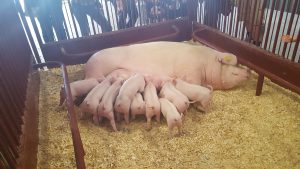Main Content
 When one thinks of pigs, oftentimes this evokes images of slop buckets and mud puddles, but modern swine production involves cutting edge technology that is both rooted in innovation as well as hard science. Swine projects in 4-H can provide opportunities for youth members to gain real world understanding of the issues surrounding the swine industry.
When one thinks of pigs, oftentimes this evokes images of slop buckets and mud puddles, but modern swine production involves cutting edge technology that is both rooted in innovation as well as hard science. Swine projects in 4-H can provide opportunities for youth members to gain real world understanding of the issues surrounding the swine industry.
Swine 4-H projects provide youth a myriad of opportunities to learn about animal and veterinary science, as well as animal husbandry and production practices. These experiences often lend themselves to gaining valuable new life skills including:
- record-keeping
- time management
- financial management
- and (arguably most importantly) responsibility
Members in New Jersey 4-H enrolled in swine projects are provided chances to gain real world experiences in animal production. These experiences in swine management can include (but are not limited to):
- Production
- Selection
- Breeds
- Reproduction
- Health
- Bedding
- and Animal Housing
Additionally, youth members enrolled in swine projects, be it market hogs, pet pigs, or breeding stock, have plenty of opportunities to gain insights about the swine industry all the while developing life skills that sets them up for future success.
In New Jersey, livestock management is an important component of the agricultural industry. In fact, as of 2017, food and agriculture are New Jersey’s third largest industry (http://jerseyfresh.nj.gov/facts/). Though the swine industry in New Jersey encompasses a relatively small portion of the overall state agriculture industry, in terms of animals science projects in New Jersey 4-H, it is nevertheless one of the highest enrolled programs. The lessons 4-H members learn with and through their swine projects typically transcend their time in 4-H and provide them lessons and memories that last a lifetime.
Rutgers 4-H is committed to providing youth outstanding opportunities to learn by doing, and through 4-H swine projects, youth have the chance to gain real world experiences all the while learning invaluable life skills. Once a month 4-H youth members, 4-H volunteers and leaders, parents, and members of the community will be connected to local resources while also sharing resources that may be currently underutilized.
Though it is easy to conjure an image of a dirty pig sprawled out in a puddle of mud, the reality of modern swine production is more accurately depicted thinking of sophisticated technology and modern science to provide producers (and owners of home hobby pets) the best resources to provide their animals safe environments to grow. Participation in New Jersey 4-H swine projects, where members learn the skills involved in modern swine production, could set youth members on a road to future successes.
By Matthew Newman, County 4-H Agent, Rutgers Cooperative Extension